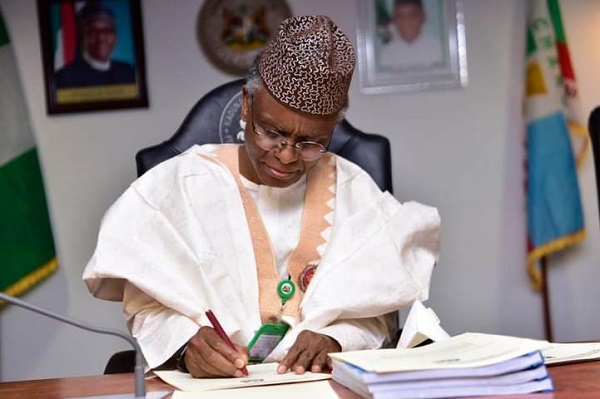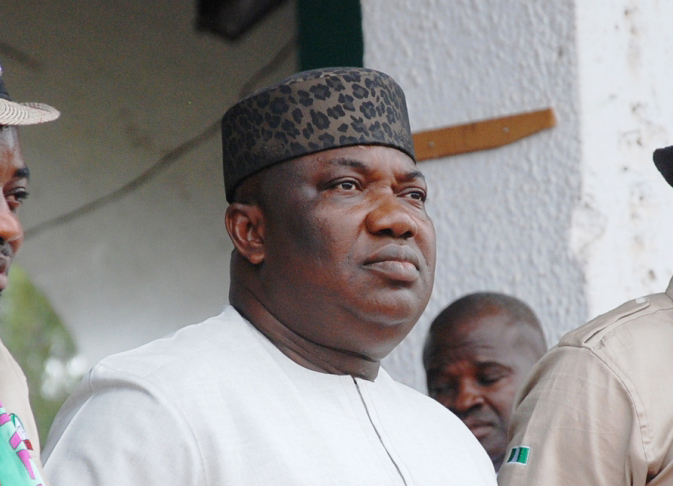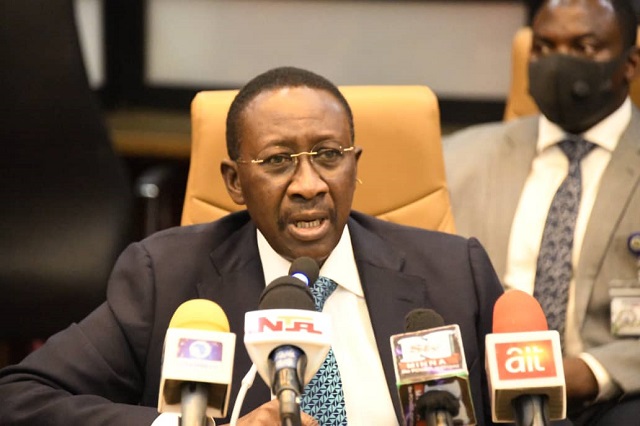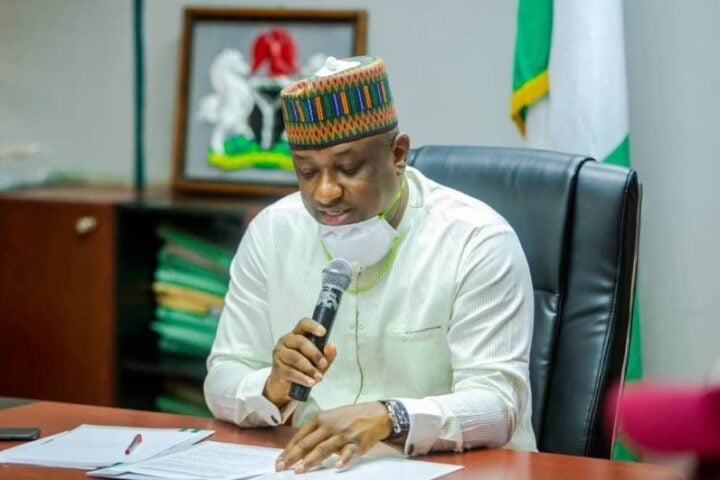BY EMMANUEL ADO
“The art of leadership is saying no, not yes. It is very easy to say yes” — Tony Blair.
Kaduna State is undoubtedly the third(3rd) most populous state, after Lagos and Kano States, with a population of about ten(10) million people, serviced by about one hundred and twenty thousand (120,000) public servants, which translates to less than 1.2 % of the total population. Before 2016, the annual budget estimates of the state was consistently in favour of recurrent expenditure. For instance, Ramallan Yero’s Budget of Consolidation and Continuity’, his last before his resounding defeat in the 2015 elections , which El-Rufai inherited, had N72.8 billion for Recurrent expenditure, about 35.72% of the budget and N130.9billion for Capital expenditure, representing about 64.28% of the budget. The twin problems, is not only in the budget allocations, but in the actual releases as year in and year out, Recurrent expenditure continued to outperform Capital expenditure.
The implication of a budget devoted to consumption, was that the state stagnated, with an alarming infrastructural deficit, and an alarming poverty rate that hovered around 61.4%, because the entire resources accruing to the state from the Federation Allocations Accounts (FACC) was “wholly consumed” by the the public servants, leaving absolutely nothing for the rest of the population of about 98.8%. A situation that the poor internally generated revenue (IGR), which at 2015 stood at a paltry N12 billion, further compounded. Clearly, a budget devoted to paying salaries wasn’t sustainable, a reality the labour unions have refused to come to terms with, not even when the federal government in 2015 had to grant the 36 states, bailout funds to enable them meet their obligations to workers or the economic challenges that the COVID-19 pandemic has worsened.
Advertisement
Kaduna State earnings from November 2020 to the last few months of 2021 went into payment of wages. Figures from November 2020 to March 2021, shows that only personnel costs accounted for between 84.97% and 96.63% of allocations from the federation account. For instance, in November 2020, the state received N4.83billion and spent N4.66billion on wages, leaving only N162.9 million balance. In January, the state received N5,123,997,767.88 billion, of which a princely N4,616,471,637.44 billion was spent on wages, leaving only N507,526,130.44. In March 2021, the trend continued with the state receiving N4.819 billion and paying N4.498 billion, representing 93% of the allocation on wage, leaving a balance of N321 million for funding of security operations, running costs for schools and hospitals, and other overhead costs. The pattern going by the April figures hasn’t changed and is not likely to change in any substantial manner, unless the surgical reforms are carried out to its logical effect.
And from the very outset, the Kaduna State Government (KDSG), had demonstrated an unparalleled commitment to reform initiatives, across many institutions to enable it actualise its socio-economic development vision of the state. The reform of the Kaduna State Internal Revenue Service(KADIRS), saw IGR collection astronomically increase from N12billion in 2015 to N50,768,523,407.34 billion, a spectacular performance, that has helped ensure the execution of numerous projects from the over 15 modern markets to the breathtaking road projects, in Kaduna metropolis, Kafanchan and Zaria townships. But for the improved IGR, the prudent management of resources, the state would have remained undeveloped and Nasir El-Rufai, would have had nothing to show at the end of his tenure, especially in Nigeria where a governor is deemed to have performed, only in terms of physical projects.
The position of the Kaduna State Government that it was “elected to develop the state and not just to pay salaries of public servants”, as part of the reasons why it embarked on some load shedding, is absolutely correct, even though it might seem arrogant and a hardline stance. Nigerians abhor the truth and prefer populist policies that have taken the country no where. Apart from the unacceptably high wage bill, most public servants are analog, untrainable and actually redundant, reasons why Nigeria hasn’t made any tangible progress. Hopefully, the disengagement exercise by the Kaduna State Government, will generate urgent national conversations about the new National minimum wage, the over bloated service, that lacks initiatives, the capacity of the federal, state and local governments to continue to employ, when the service is over bloated, considering the economic challenges and the challenges of job creation.
Advertisement
There is no denying the fact that the absence of a social security net, for unemployed citizens has made government assume the role of ultimate main employer of labour, even when statistics and the recent stay at home order, due to Covid-19 pandemic have confirmed that it actually needs a very limited number to function. Labour and her apologists in justifying their opposition, continue to latch on to the Constitution of the Federal Republic of Nigeria, especially Chapter II, the Fundamental Objectives and Directive Principles of State Policy, section 14,sub -section (b), which states that the security and welfare of the people shall be the primary purpose of government. The fact remains that while it has indeed placed responsibilities on the various levels of governments to help actualize the objective, there is nothing in that provision, that makes it a must, that all Nigerians must work in the public service. But the often quoted section, the refuge of labour, when given a wider interpretation, should include the government providing a conducive environment for the private sector, which remains the engine of growth, but it’s usually ignored.
The nauseating argument by lazy labour leaders, that the government has a responsibility to provide every Nigerian a job, is the main reason why the Nigerian National Petroleum Corporation (NNPC) has for over twenty five(25) years continued to keep redundant workers. Going by its first ever audited report in 43 years, the corporation recorded an astounding N803 billion loss, due to the non-functional state of it’s refineries. Were the corporation a private company, it most definitely would have been declared bankrupt and liquidated. In spite of being bankrupt, it continues to pay salaries and huge allowances of redundant workers, including engineers that are rusty.
Labour, which ought to be driving the conversations on how the various governments can create millions of jobs, for the teeming youths, has unfortunately remained preoccupied with bread and butter issues- negotiations for a National minimum wage, that has proven totally unworkable, due to the world wide recession that has adversely affected demand for crude oil, with COVID-19 killing of any hope of quick recovery. But even if the world economy picks up, the future outlook is still bad for Nigeria, given the desire of the world to tackle the issue of climate change and fossil fuel is the first victim ,so demand for crude oil, our major foreign exchange earner will drastically reduce, with grave effect on monthly allocations.
The federal government and other state governments can continue playing the ostrich, but certainly not for too long, because they can’t run away from the inevitable consequences of refusing to take the painful, but necessary hard decisions, like the Kaduna State government has. The Stephen Oronsaye report which recommended the merger of some agencies with duplicate functions will continue to gather dust because the federal government, lacks the political will to implement it. Even though faced with the unacceptable high cost of governance it constituted the Oronsaye Committee to recommend the restructuring and rationalization, of parastatals, commissions and agencies. Though the federal government appears to have tactically killed the report, by rejecting many of its far reaching recommendations, it will sooner than later go back to it.
Advertisement
Despite, the campaign of calumny, Kaduna State has once again shown the way forward, with its commitment to build a public service that is lean, effective and the capacity to carry out its responsibilities. It has addressed major challenges like the aging workforce, dwindling resources and lack of capacity to meet the challenges of modern day governance, through the Public Service Revitalization and Renewal Programme, implemented in a fundamental manner. Moving ahead, it has injected a new generation of vibrant, well educated and skilled young men and women to succeed the aged workforce. The result is a responsive service, with a defined mandate, unlike the dysfunctional Public Service that was unproductive, but very “focused on taking care of itself” that El-Rufai inherited in 2015.
El-Rufai has argued and rightly too, that “No Nation develops beyond the capacity of its Public Service”.
So what are the options for the disengaged staff and the unemployed? If El- Rufai is not offering options, then the charges by labour leaders that he is “wicked and unconscionable” will hold water. From 2015, El- Rufai, he has consistently been unambiguous in affirming the key role of the organized private sector in job creation and in driving the economy of the state, because the government can only directly employ a few people. With the disengagement, Nigerians should expect the intensification of efforts to attract more investments, while those on the drawing board like the Dangote Peugeot Assembly Plant, the Moroccan Fertilizer Company will be hastened.
This is the light in which the vigorous implementation of the Kaduna State Public Service Revitalization and Renewal Programme, must be seen. Whoever takes over in 2023, from Nasir Ahmad El-Rufai, in 2023 will forever be thankful to him, for resolving many issues that other governors would be facing.
Advertisement
Views expressed by contributors are strictly personal and not of TheCable.
Add a comment






